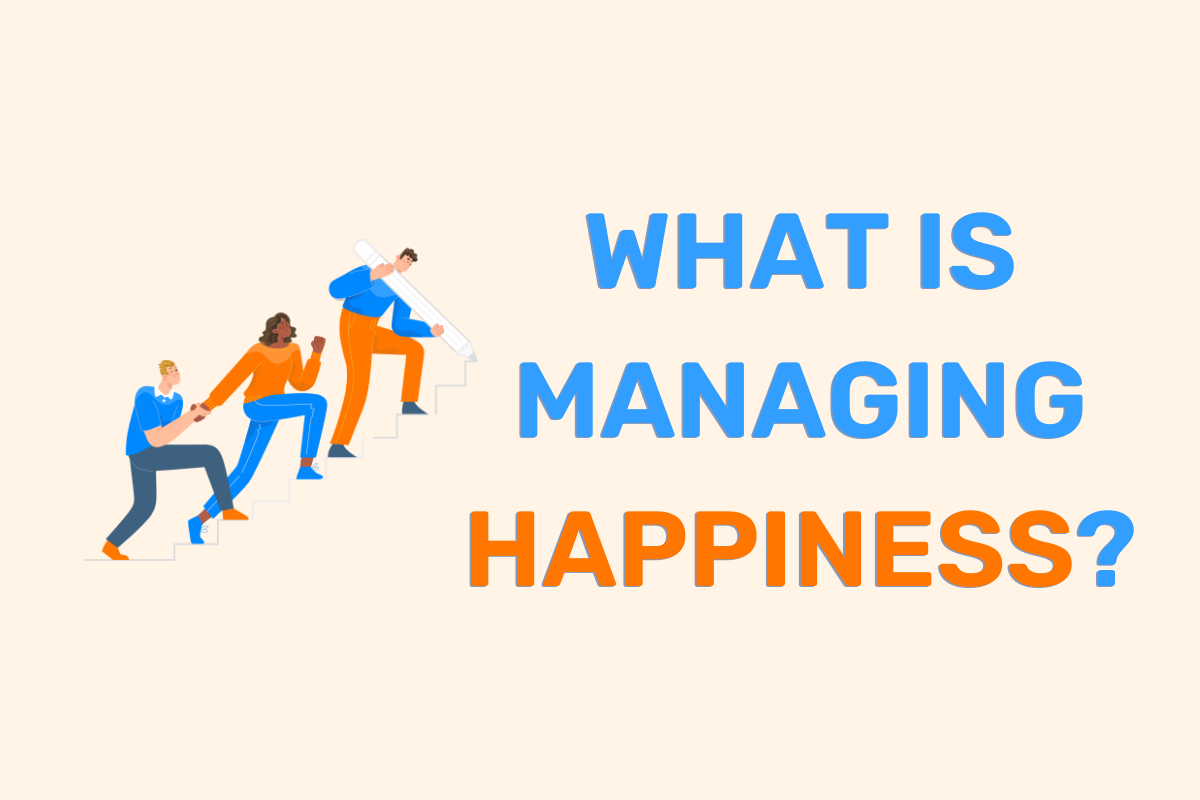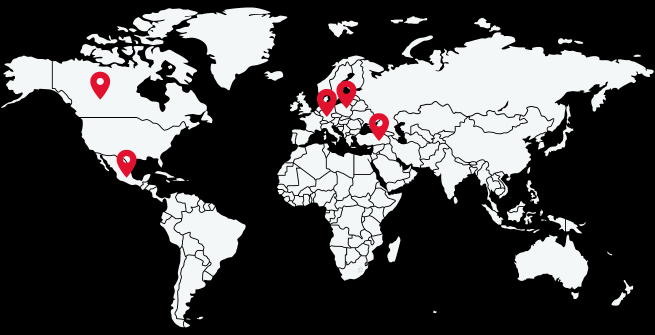Managing Happiness is the culmination of methods and mindset practices that enable you to be at your peak performance. Let’s face it: happiness is everything! One could easily say that it is the meaning of life and that everything we do is in the effort to achieve it. But so many of us are wandering around aimlessly as if we were a donkey with a carrot tied to our head and dangling before our eyes, in other words, happiness and true contentment seems impossible to actually grasp.
Perhaps it is the combination of my German heritage and growing up with a Buddhist father, but I have always found a way to control my emotions and balance my life in a way that enabled me to thrive. I have had multiple successful startups in a number of countries and have always managed to remain level-headed and content. When crisis emerge, I am able to respond in the way I choose to rather than react out of uncontrolled fear. I have made the concept of acting out of “Love not Fear” my life mantra and every response that comes from me, comes from love and this makes all the difference.
In order to be able to “respond” to challenges in a constructive manner and not find yourself “reacting”, which in most cases only incurs harm, it is vital to have the right mindset. With the right mindset, you can choose how you want to navigate your life. And while you may not believe it yet, we all have the luxury of being able to choose who we want to be and how we want to respond to any challenge we face.
With the right mindset in place, it becomes easy to establish the right habits you want to cultivate to make you thrive in every area of your life and with planning you can actually begin incorporating them into your life.
The idea of sharing the methods I have been practicing for over 20 years first arose when we were hacked at MaxCDN, an event which could have had devastating consequences. But instead of dwelling under the weight of this unexpected occurrence, I went straight into repair mode and by taking swift action the crisis was averted. A member of my team asked me how I was able to remain so calm under such immense pressure and his question started a rollercoaster of answers as to why.
What I discovered is that the reason why I am able to remain calm and collected and consistent is because I live according to my core values, vision and mission. I have devoted my life to providing value to others, which for me is my main purpose in life and something I discovered early on. I believe it has led to my success and I know it has led to my happiness.
By knowing how I want to show up for myself, in my professional role and with my family and community my life seems to unfold in magnificent ways.
I want to share the practices that I believe can truly improve peoples’ well being with as many people as possible. Some stem from the wisdom of ancient civilizations, while others are tried methods that help people establish the mindset, habits, planning, productivity and communication skills that make them truly happy with their lives.
Over the past decade, I have been offering courses and mastermind retreats all over the world for entrepreneurs on how to manage their happiness. Hundreds have taken the program and I have received countless messages recounting the ways people’s lives have drastically improved. The response I have gotten has made me realize that sharing these life-changing practices to a larger audience means even more people will be able to make positive changes in their lives.
Hence, the Managing Happiness program was developed and will include a series of courses geared towards self-leadership to play at your A-game in life.
How does the program work?
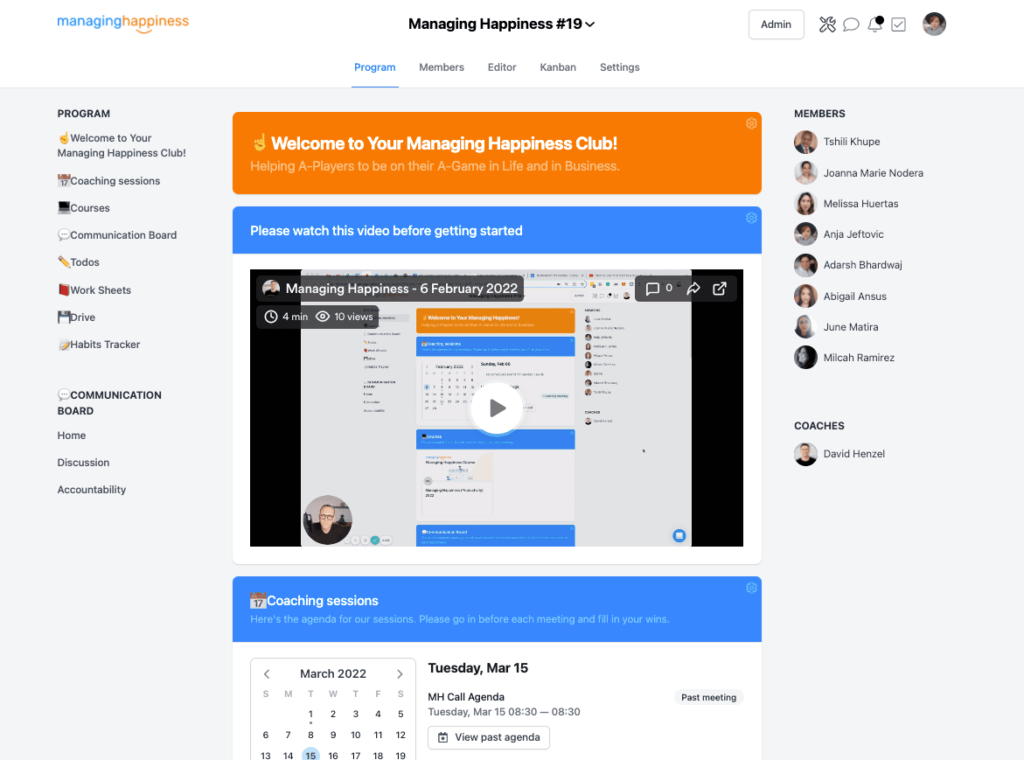
The Managing Happiness program consists of online courses that include weekly video coaching sessions and peer accountability cohorts led by an expert guide. The six-module courses contain weekly coaching videos and a series of todos and exercises to complete, which you can do at your own pace. Including an introductory session, we will meet up online once a week for six weeks for a live coaching and Q&A session with me, while peer accountability sessions will also be held weekly.
Peer accountability is an integral part of the program as it serves to provide positive peer pressure and reinforcement in an intimate and supportive environment. True bonds are made and immense insight is gained from progressing through the program with your accountability buddies.
When undergoing personal change, it can be challenging to share what you are experiencing with your family and friends and so having a venue to comfortably talk about what is unfolding in your life, with a group of individuals also seeking to improve their lives is literally priceless. In every cohort, there are multiple peer accountability groups that take the course during the same six-week period. Participants get to choose from a selection of the skilled guides that will lead them through the program based on their interests and which time slot fits best. With the MH community of entrepreneurs and peak performers from all over the world seeking to level up their lives, you may likely find that this weekly meetup will become one of your most anticipated social events.
The MH Personal Mastery Course
Personal Mastery means to exist according to your vision and mission and aligned with your values. It also means to be in a state of perpetual learning and self-development. The same definition can be applied to self-leadership as the two concepts are one and the same.
Any successful business knows exactly how they want to grow, but so many of us as individuals never take the time to define what our own personal vision, mission and values are. Couple that with the fact that our lives are multifaceted and we show up differently in the varied roles we play. This means that in order to live according to our authentic intentions, we must clearly know what they are.
The North Star concept means to have guiding principles to serve as a “Polaris”, in other words to be guidelines for going in the desired direction. Companies use this concept to optimize their success by operating towards a defined goal. Yet somehow, the notion of this practice of designing your own “Polaris” to serve as your personal guiding light in life has fallen by the wayside for much of the general public. But the benefits of this practice are literally priceless. Once you have defined the values you want to operate by and your life vision and mission everything you do has purpose and takes you directly in the direction of your goals.
Recognizing the roles we play…
While knowing your personal vision and mission is invaluable, it is also critical to define who you want to show up as in your professional role and the person you want to be for your family and community.
As individuals, we are multifaceted and balance a variety of roles in our lives, which includes our careers, family life and community. Not only do we tend to be different people in each of those roles, but we also have different goals for each of these aspects of life. This is why it is important to establish your vision and mission for each of these roles as well as to define the goals you want to achieve for yourself, in your profession and with your family and community.
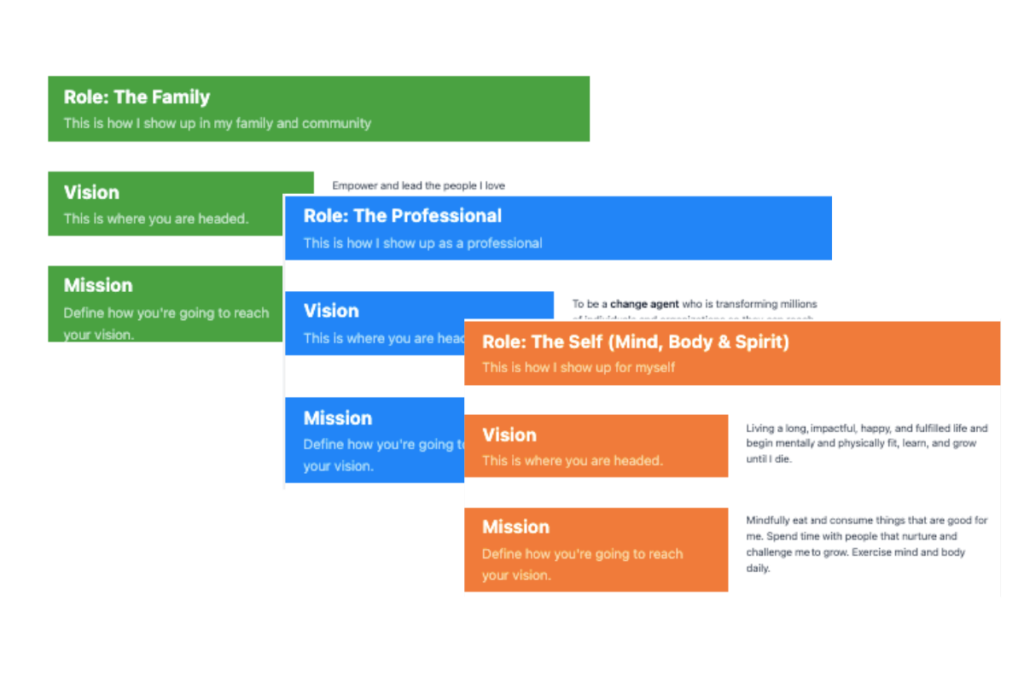
Writing your intentions sets them…
We may have an idea of what our goals in life are and the set of values we choose to live by, but there is immense value in having these concepts written out in words. Writing them down almost sets them in stone, it makes the concepts visible and visualizing them makes them palpable. In other words, when you have your vision, mission and values and the goals you set for yourself visible in words it makes it much easier to keep them constantly in the forefront of your mind, which will undoubtedly guide you towards them.
We are also always in constant change. Our life situation, physical states and mindset are in continuous transition as change is a constant in life. This is why it is crucial to always reference your values to remain on course in high tides and low tides and to revise them when you see areas you can further optimize. This is why having a living document such as the MH North Star, that you can always access, interact with and change is an exceptional navigational tool to stay on track with your goals in every role in your life.
Why Peer Accountability is the Key!
While having a North Star to perpetually serve as your own personal guiding principles is vital to achieving the life you want to lead, it can be challenging for most to actually set aside the time to concentrate on defining what we want our vision, mission and values to actually be. But we do aim to please and that’s why by meeting regularly with like-minded individuals also seeking to improve their self-leadership skills can be a surprising driving force to find the answers you seek.
By being in an encouraging and relaxed environment of insight, reinforcement and support, you end up succumbing to the positive peer pressure. And, this is why peer accountability is actually the key to finally unlocking whatever has been holding you back.
The Benefits of Peer Accountability
The critical components of accountability that drive change…
- Weekly online group gatherings with like-minded individuals all over the world
- Positive peer pressure through insight, reinforcement and support
- Feeling inspired and inspiring others to define their purpose
- The opportunity to share and receive feedback on your personal growth efforts
- Insight into the similar successes and challenges faced by others
- The ability to be completely authentic in a remote and confidential setting
- Bonding with others sharing the journey to personal mastery
Positive peer pressure makes you make it happen!
The bottom line is that peer accountability and social support is of vital importance when you are discovering and challenging new aspects of yourself. While you may be fortunate enough to have accountability buddies embedded in your community, many struggle to find people close to them open and willing to delve deep into discussing personal growth.
But having a mutual exchange with a group of peers on everyone’s findings from the most influential exercises in self-leadership is a truly valuable social experience and one you will always welcome. The connections made and insight gained drives momentum. And continuous momentum in the right direction is what will take you exactly where you want to go, while enjoying the ride along the way.
GETTING STARTED

The first step to begin making positive changes in your life is to make an honest assessment of where you stand in it at the present moment. While we may think we know what we want to work on to add to our lives, sometimes we can fail to recognize the areas in which we are truly lacking. It can also be difficult to understand why certain aspects of life are more challenging for some people than others. But there are two simple exercises you can do that will give you a greater understanding of your strengths and weaknesses, which will help you to define the goals you want to achieve and the habits you plan to cultivate in order to do so.
Personality Test
One of the most insightful tools out there to better understand your thought processes and emotional characteristics is to take a personality test. In many cases, employers will require a personality test before you start a new job and there is a concrete reason for this. There is immense value in knowing the areas we excel in and what our personal pitfalls are to be able to apply the right methods to avoid them.
But the benefits of understanding when your personality shines and when you tend to struggle should also be applied to every aspect of your life; the self, the professional, in love and with your community. Being aware of your own core personality traits will help you to make conscious decisions to direct your life accordingly in all of your roles.
Each of us are unique, but there are a number of core traits that have been associated with different personality types that are deciphered through an easy multiple choice test that takes just minutes to complete yet you end up with profound results. With clearly explained results, Personality tests can show you what your core traits are and that in itself will help you to define your values. Learning what aspects of your personality may be holding you back, will also better equip you to avoid or alter them. Introspection is not just integral to personal development, it is that vital element of the process to ignite change.
To know what you want to change in your lifestyle and how, you need to first be aware of what does and doesn’t serve your personality traits before you even get started. Our personalities can also change over time and through different circumstances and so you may find that certain characteristics have or will change over time, which is why there is also immense value in retaking personality tests, even if you have taken one before.
The introspection gained from what you have intuitively already changed about yourself and what you seek to improve in the future will make conscious transformation much easier. This is because the areas that may need adjustments in your personality are clearly spelled out for you in test results that you can refer to regularly. You may also find the results provide answers to questions you didn’t even know you had.
Why should I take a Personality Test?
- Know Yourself: be aware of your strengths and weaknesses
- Understand your clearly defined personality patterns
- Gain clarity on how you interact with others
- Find meaning in your faults and learn from them
- Think of new ways to make positive changes
Wheel of Life
The Wheel of Life is one of the most influential life coaching tools to understand just how fulfilling your life actually is and the areas where you stand to improve. This simple exercise, which has been used since its development in 1960 is a color-coded pie graph divided by five to ten categories, which are the most important areas in our lives.
The categories generally include:
- Health: Your physical and mental health
- Relationships: The quality of the social connections in your life
- Mindset: Overall attitude, emotional state and motivation
- Finances: Where you stand financially on the grand scale
- Career: Your professional roles and aspirations
To fill out your Wheel of Life you simply think of where you stand in each of these areas by giving each one a number from 1 to 10, or 0 to 100%. Then you fill in the graph up until the equivalent line for each area of the pie. Once you have completed the exercise, the areas of your life where you are thriving are clear to see, while the areas in your life that may be lacking also become plainly obvious. This simple exercise can provide surprising results when offering a frame of reference for where you need to start devoting more attention.
Why is the ‘Wheel of Life’ so profound?
You get to:
- Clearly see where you feel you excel in life
- Gain awareness of the areas where you are lacking
- Define actions to take to improve
- Change your life circumstances
The Wheel of Life exercise is the best way to understand where you stand at any given moment and as you start setting intentions and begin implementing them to improve the areas of life where you feel you are lacking, your Wheel of Life will also change. While both the Personality Test and the Wheel of Life are the best tools to get started on self-leadership, they are also both valuable exercises to regularly revisit in order to fine-tune the goals you have in your life and the habits you want to have to achieve them.
WHAT DO YOU REALLY WANT?
This is and should always be the first question you should be answering to yourself. We tend to just cruise by in life or are led by the circumstances in our environment.
Not only will you never give your all when you don’t know your own personal defined purpose in life, but also the “urgent” will always override the “important” meaning what truly matters to you may fall by the wayside.
This is why defining your purpose in life, knowing the values you want to live by and designing the person you want to be is vital to ensure everything you do in life has meaning.
To know what you really want out of life and who you want to show up as in each of your roles takes work. Like anything we want to improve, it takes sitting down and actually thinking about the concepts that you want to make your core values and to have a clearly defined vision and mission.
Your North Star Document
In the MH Personal Mastery Course you will prepare your own North Star document that will serve as your guidelines to navigate through life. Your North Star is a living document that you can constantly adjust to optimize every aspect of your life. Let it serve as the deciding mechanism when you are faced with tough choices, or any choice for that matter. Regularly referring to your North Star will remind you of the vows you have made to yourself, it will motivate you and always lead you in the right direction. It should especially be used as your filter when you decide how to spend your time, energy and love.

What’s in the North Star document?
1. Core Values
| Your values | The values that you want to live by |
2. Role: The Self – This is how I show up for myself
| Vision | What your purpose in life is |
| Mission | How you will fulfill it |
| Personal Goals | This quarter and this year |
3. Role: The Professional – This is how I show up as a professional
| Vision | What you aspire to in your career |
| Mission | How you will get there |
| Professional Goals | This quarter and this year |
4. Overview – Planning
| Annual Plan | Big Things This Year |
| Monthly Plan | What’s coming up this month |
5. Mindset & Clarity – Mantras and coaching questions
| Mantras | Affirmations for weekly planning |
| Coaching questions | Choose your clarity questions |
6. Planning – List your personal, professional and family goals
| Monthly goals | Note them and execute |
| Quarterly goals | Note them and execute |
7. This week’s plan – Daily focus tasks and needle movers
Your Core Values
To truly start to understand how you can optimize your life, you need to stop everything and sit down and begin defining what the core values are that you want to live by. Truly expand your mind to go beyond the constructs previously set for you by your circumstances, environment or culture and think about the person you really want to show up as in all of your roles.
Your values should constantly be in the forefront of your mind so you can refer to them regularly for every decision that you make. Your values will be your guide for where you want to go as well as your filter to make sure every move you make is in alignment with the direction you want to go.
Defining your core values may seem daunting, it may take time and they may change constantly and that’s fine. There are a number of tried and true exercises that you can do that provide insight into the core values you choose to live by.
How to Define Your Core Values
- Check out this list of examples and see which values resonate with you
- Do the Funeral Exercise or write your NY Times 100th birthday article
- Write your Bucket List
Top Tips to keep your values in mind
- Have your values written out and ready to reference, such as in your North Star
- Make sure to have no more than 10 core values so you can know them by heart
- Create a short and long version of the core values. The short one is catchy and easier to remember while the long version provides a more detailed description.
For example, these are mine:
David’s Values
- CHOOSE LOVE – Make decisions out of love and not fear. Love unconditionally.
- OWN IT – Build trust & loyalty through total accountability & transparency.
- DON’T STOP – Be driven to change and grow and believe in yourself.
- DELIVER VALUE – Enrich the lives of everybody we come in touch with.
- KEEP IT SIMPLE – Only do and buy things that matter. Simplicity is the highest form of sophistication.
- KEEP IT REAL – Being authentic. Be yourself. Not a HELL YES is a NO.
- COURAGE – Don’t hold back. Share the love!

Begin With the End in Mind
To “Begin with the end in mind” means to have a clearly defined direction and destination in everything you do. It is Habit No. 2 in the best-selling The 7 Habits of Highly Effective People. The book has sold more than 20 million copies since its publishing in 1989 and was written by American educator and businessman Stephen Covey, who in the book actually asks his readers to put the book down right then and there and do what he refers to as the “Funeral Exercise”.
What is the Funeral Exercise?
The Funeral Exercise is pretty simple, but I bet most of you haven’t done it yet. I mean nobody wants to think about their death and having to leave loved ones behind. But if you can get past the morbidity of it, there is a wealth of value in truly visualizing what the people you left behind would have to say about you. In the Funeral Exercise you do just that, you literally write your own eulogy, but spoken from the people in your life that can talk about how you lived in each of your roles.
Questions such as these may pop into mind:
- Were you a good parent, spouse or boss?
- Were you healthy and happy?
- Did you fulfill your life goals?
As we play different roles in the various areas of our lives, Covey recommends having someone speak at your funeral who knows you personally, such as a spouse or close friend. He also advises having someone from your professional life as well as community. And, he asks his readers to focus on what they would say about your character, contributions and achievements in life.
I say funeral, you say celebration!
For me personally, it was the Funeral Exercise, which I did at a time of my life when I was at my lowest. My wife had been diagnosed with cancer and I had recently lost my mother and grandmother. I took a moment to step back and really think about what was important for me and my family and what impact I want to have on the world. It was this exercise and reassessing my values accordingly that led me to sell a company I had at its prime and to pack up and relocate to a destination that was closer to my wife’s family.
If you absolutely dread the thought of drafting up eulogies then you can write a mock-up article that could be published in The New York Times when you turn 100 or the speeches that would be delivered by the different people in your life at your centennial birthday!
Your Bucket List
A Bucket List is also one of those extremely simple exercises that none of us ever tend to do. But the thing is, if we don’t first conceive all of the adventures we want to have then it is much less likely that they will actually come to fruition.
Once again it goes back to the concept of actually writing down intentions being the first catalyst to setting them. Exhaust your mind to conjure up a list of your wildest dreams and then keep that list easily accessible. When you have something tangible to hold on to that can remind you of your goals, that alone can be the trigger to get you eventually doing them. Once you have it, keep it close and somewhere you can regularly reference when you plan out your next month, quarter and year.
Your Bucket List will give you an idea of what you want to achieve in life. From there, begins the thought mechanism of figuring out how you can actually achieve said goals. It is that “how” that can help answer the question of “who” you want to be and the values you will abide by to become that person.
P.S. Creating a Bucket List can be an excellent family or social activity. Not only is it fun and certainly a conversation-starter, but you also get to learn more about the inner workings of the people around you and gain insight into what drives their deepest desires. I kid you not, from my wife’s bucket list alone, I not only learned she wanted to be a carpenter, but also got a wealth of ideas for holiday gifts to give her!
Top Tips for Creating a Bucket List
- Start with easily achievable activities
- Think of things you wanted to do as a child
- Ask friends what would be on theirs
- Add activities for each of your roles
- Look at magazines or social media for inspiration
HABITS ARE EVERYTHING
Learn why habits are everything & begin to establish the right ones.
Why Habits Matter
The bottom line is this: the habits you do today are what will define your future. But not only that, the habits you do now have a ripple effect into every area of your life and every moment that unfolds in them. So you have to pick them wisely as it is through your habits that you will achieve your goals.
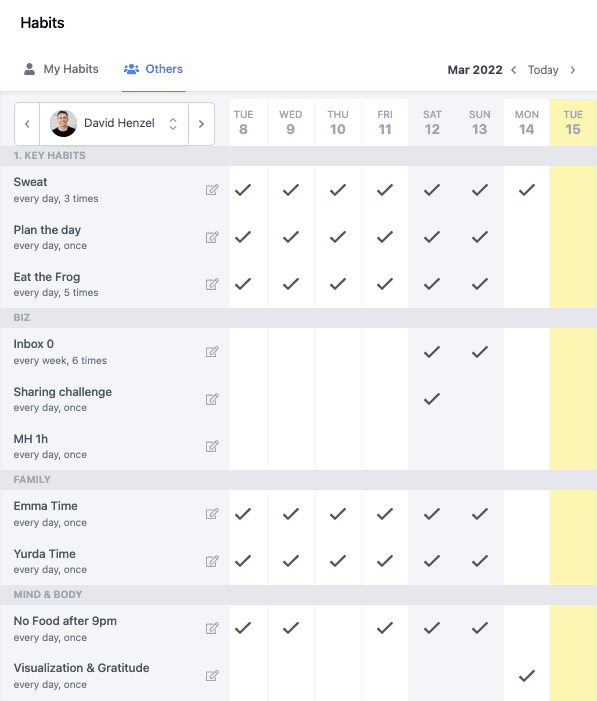
Know Thyself
But we only have a certain amount of time in the day. So, how do we fit in all of the habits we want to cultivate in our lives? The answer is: By Knowing Thyself!
The Know Thyself document is another living document that you can constantly use to optimize the habits you want to cultivate in your life.
To Know Thyself you need to know:
- Your top three personal goals
- Your top three key habits
- Things that Make You Happy
- Your Gratitude List
- Your Not To-do list
- Your Restart Routine
- Error Log
– Your top three personal goals and key habits can be introduced to improve the areas in your Wheel of Life that have room for growth.
– Start small with “challenging but not overwhelming” habits that you can constantly improve
– Know what makes you happy so you can do them more often
– List everything you are grateful for in your life
– Reassess the habits you have now, by tracking where you spend your money, time and energy
– Add the habits that do not serve you to your Not To-do list
– Have a Restart Routine, which is some form of pampering such as a massage or a quick getaway for those times when you need to push the reset button
– Last, but certainly not least is the Error Log which has two columns: Problem and Solution. This could be the most important takeaway when it comes to cultivating the habits you want in your life. The Error Log is where you list the “Problem” ie: what went wrong and next to it is the “Solution” column, where you write down ways to avert the problem next time.
For an Error Log example: A “problem” could be not waking up early enough and the “solution” could be eating an earlier dinner.
The bottom line is: the Error Log is how you optimize your habits so refer to it regularly.
It’s All About Mindset
Mindset is the first step: how to be emotionally resilient and learn acceptance.
We all have tough times and face undesirable challenges, but it is important to be emotionally resilient to successfully weather any storm. People have overcome tremendous obstacles as a result of having the right mindset. Luckily though, we don’t have to have faced challenges to acquire the right tools to do so, we can learn right now how to navigate through life when things get rough.
What many don’t realize is…
Having the right mindset is the result of having the right habits.
While some habits you want to start tackling may seem huge, interestingly enough some of the simplest habits you can start doing right now, may actually be the ones that catapult the most significant change in everything that you do.
There are two habits that you can begin incorporating into your life today that are truly effective in helping you manage your happiness by always having a clear perspective on life and they are: ACCEPTANCE and GRATITUDE!
The Power of Acceptance
Whether it be dealing with a traumatic incident, guilt or really anything unwanted that is beyond your control there is a decisive way you can handle the situation and that is by accepting it. The moment you choose to accept an undesirable situation, you can begin to seek constructive solutions to rectify it. Instead of “reacting” to the negative development, we can make the decision to accept and move on by “responding” to it.
Don’t react, respond!
An easy way to begin practicing acceptance as a habit is to recall the Serenity Prayer. First written in 1951 by American theologian Reinhold Niebuhr in the simplest of verses that make it stick, saying the Serenity Prayer in tough times can become a regular habit that can change your life and release you from past crutches that have possibly been holding you back.
The Serenity Prayer in short is this:
Grant me the serenity to accept the things I cannot change, courage to change the things I can, and wisdom to know the difference.
Gratitude is Happiness!
Feeling grateful for all that we do have in life is literally one of the best feelings there is. It could be easily argued that gratitude is in essence a form of happiness. If you can read this now, then you know you must have something to be grateful for as you are already in a better position than a significant percent of the world’s population. The benefits of being grateful are overwhelming and ripple into every aspect of your life. But to be grateful, we have to actually practice it and make it part of our daily routine.
I personally have what I call a “Gratitude Rock”. I keep it in my pocket where it serves as a constant reminder of all that I am grateful for. And, if I ever feel overwhelmed, I stop and pick up my gratitude rock and it helps me to look at the greater picture and remember all of the amazing things in my life that I am truly grateful for. Learning the power of acceptance and incorporating a regular gratitude practice are truly effective ways to maintain a clear perspective on life.
So, I highly recommend that everyone have their own “gratitude rock”, which is of course open to individual interpretation. Your “gratitude rock” could be a crystal or a necklace charm, a bracelet or better-yet even a whole journal devoted to listing that which you are grateful for. But don’t only have a gratitude rock for when times get tough, we should actually all incorporate a regular gratitude practice every single day of our lives. I guarantee it will make you happier. You just need to manage the time to do it!
Have a gratitude rock and make a gratitude practice a daily habit!
Setting Up Your Habits
The MH Habit Tracker is a calendar and tracking tool to schedule in the habits you want, check them off daily, track a metric and to share with others to better hold yourself accountable.
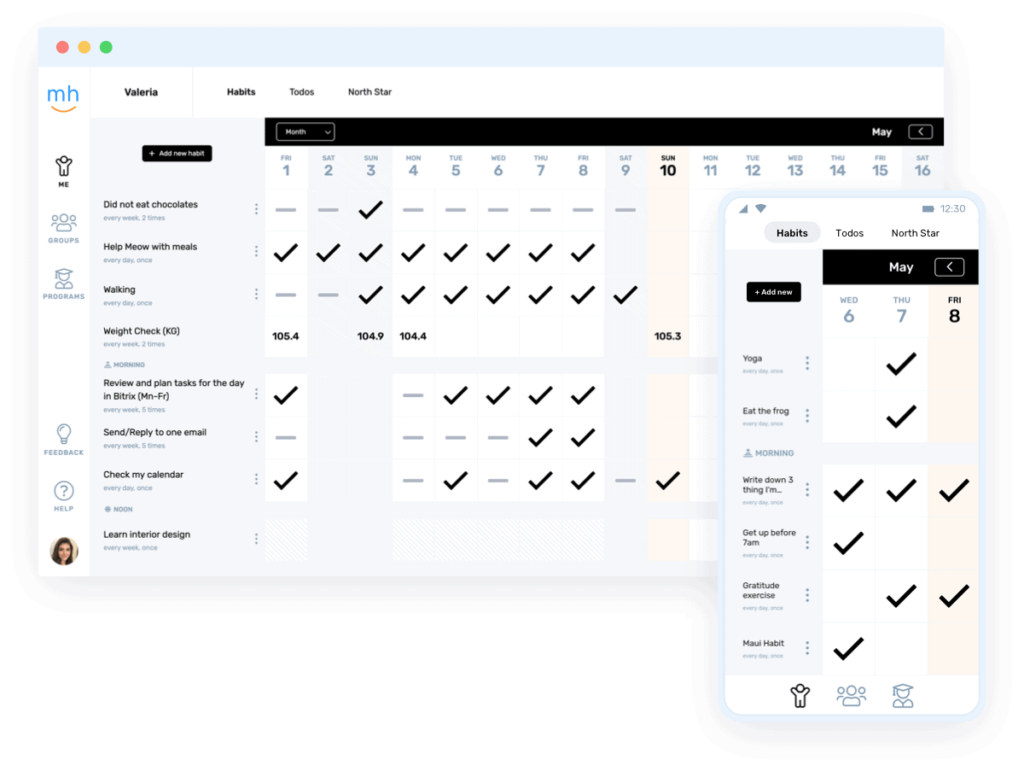
You can customize your calendar to schedule in the habits you want to include in your daily, weekly and monthly schedule. You can then check off each habit as you successfully complete them or note when you don’t, which will help provide insight into troubleshooting the reason why.
In Peer Accountability groups, the MH Habit Tracker is accessible to all as going over the intended habits and discussing constructive ways and sometimes even taking on challenges together are all par for the course to finally realizing the lifestyle you seek for peak performance.
The advantages of the MH Habit Tracker:
- Schedule in habits according to time blocks and days of your choosing
- Check off habits completed and feel accomplished
- Track your habits with metrics
- Share your findings with your peers and get feedback
- Adjust your habits to optimize them accordingly
KNOW THYSELF
Having a Vision & Mission for each role in life
Having a defined “vision”, which is where you want to go and a “mission”, which is how you are going to get there, has long been the foundation of many successful businesses and serves as the guidelines for life for many influential people. While I believe it is vital for all of us to have a defined purpose and plan to achieve it, we all have various roles in life such as in our profession and with our family and community or “tribe” as it were and it is therefore important to also have a clear vision and mission for these significant areas of life.
These are mine:
Personal Vision
Living a long, impactful, happy, and fulfilled life and being mentally and physically fit, learning, and growing until I die.
Personal Mission
Mindfully eat and consume things that are good for me. Spend time with people that nurture and challenge me to grow. Exercise my mind and body daily.
Professional Mission
To be a change agent who is transforming millions of individuals and organizations so they can reach their full potential and consciously live the life they desire.
Professional Vision
I do this by launching personal development clubs, building productized services and a group coaching platform that empowers thousands of coaches to help millions of people succeed.
Family & Community Vision
Empower the people I love
Family & Community Mission
I provide physically and emotionally everything my family needs to thrive. I remove uncertainty and provide direction.
How to define your vision and mission…
- Check out the personal mission statements of others for inspiration
- Ask yourself clarity questions such as “Why are you in business?”
- Find your calling so you never work a day in your life
- Allow for “Healthy Egoism” to be on your A-Game
- Run your family like a business & schedule them in
- Know that positively impacting others is the prime source of happiness
- Create a Vision Board: there is magic there…
- Make “Love not Fear” your mantra!
The most important lesson you can learn from this program is this:
MAKE EVERYTHING YOU DO BE OUT OF “LOVE” AND NOT “FEAR”!
I promise you that living by this mantra is a gamechanger…
Planning and Clarity
Don’t let the “urgent” override the “important”…
Never underestimate the importance of planning your goals for every role in your life. If you don’t actually schedule in what you want to achieve and how you are going to do it, then you will find yourself constantly pulled in other directions. In other words what seems urgent will take precedence over what is actually important to you. The simple trick to only doing what truly matters to you is to define your goals in life and then plan for them.
Constantly asking yourself “Clarity Questions” aka “Coaching Questions” is another one of those critical components for personal mastery that is very much overlooked. We tend to want to set our goals and then set them aside as if they are set in stone. But like life, our habits, our goals and really everything is in constant transition and it is up to us to ask ourselves the right questions to be on our ultimate path and enjoy the journey along the way…
Coaching Questions
These are just some of the questions I ask myself regularly and some every day.
- How can I be of service / value today?
- How can I reduce uncertainty and provide direction?
- What can I share today?
- Which task is my frog and what is essential and moves the needle forward?
- What is unclear right now?
- What should I start / stop?
- What are the 3 biggest problems right now?
- What to focus on if I only have 4 hours this week?
- How can I add more value to more people in less time?
- Why me? Why is it important? Why now? Does it impact millions of people?
If it isn’t a “Hell Yes”, it’s a “No”!
This quote by Derek Sivers is another excellent mantra to keep in mind to help you make the right choices on how to spend your time.
Last but not least is the importance of mantras and positive affirmations that you can recall to yourself to remember what is important to you. Some sayings hold a special place in people’s hearts and everyone has their own words they resonate with, but these are mine.
- Act out of love not fear
- I only do things that compound positively
- I always move people forward and show them on the backend what they have accomplished.
- You can’t pick your future but you can pick your habits and they will form your future
- Thank you for all the beauty in my life and the time I get to spend in this amazing existence! Thank you for surrounding me with such amazing beings and for all the prosperity, health, and fun I get to experience!
- Thank you for letting me achieve all my important goals and the wisdom to know what the right goals are.
- Give me the willpower, clear thought, and ability to have a massive positive impact on the world and millions of people
The exercises, documents and tools you will possess once you have completed the Managing Happiness Personal Mastery Course:
- North Star Smart Doc: Core Values, Vision and Mission for each of your roles, your goals listed and a calendar to plan for them, your mantras and clarity questions
- Habit Tracker: To schedule in, check off, track metrics and share
- Know Thyself Smart Doc: Top Personal Goals, Key Habits, Your Happiness and Gratitude List, Your Not To-Do List, Restart Routine and Error Log
- Test Results from the 16Personalities Test
- Wheel of Life
- The Funeral Exercise
- Bucket List
- Vision Board
By completing these life-altering exercises and having the right tools to regularly refer to in addition to the support and feedback offered by weekly Peer Accountability sessions, you will have the foundations you need to make the changes you want and to always fall back on when you ever need to reassess your life.

